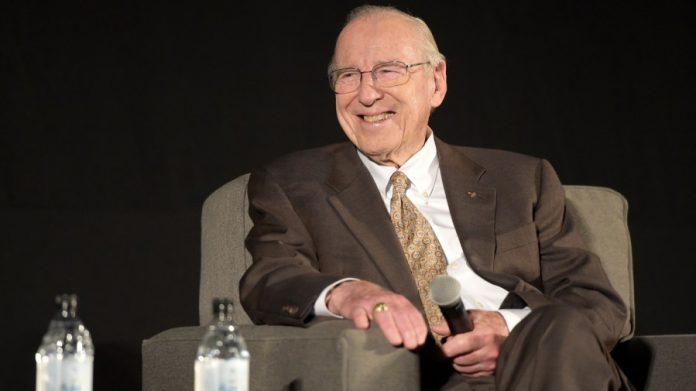
Recently, yet another Apollo astronaut, Jim Lovell, passed on. Lovell’s fame was as defined by his role as a pop culture icon as it was by his astronaut heroics.
Everybody who came of age during the Apollo race to the moon knows the name of Captain Jim Lovell. He flew on the missions of Gemini 7, Gemini 12, Apollo 8 and Apollo 13.
Apollo 8 was the first crewed orbit of the moon, which featured the famous Christmas Eve 1968 reading from the book of Genesis as the Earth rose over the surface of the moon. The mission, the first beyond low Earth orbit, provided a beautiful cap to what was otherwise a horrible year.
But Lovell is most famous for being the commander of Apollo 13, the 1970 mission meant to land on the moon, but which instead became a harrowing drama, thanks to an explosion in the Apollo spacecraft service module, in which the crew may not have made it back alive.
That they did was a great credit to Lovell, the other two crewmen of Apollo 13, Fred Haise and Jack Swigert, and the people in Mission Control in Houston.
Twenty-five years later, it was only natural that Ron Howard chose the Apollo 13 mission as a subject to put to film about space exploration.
The movie starred Tom Hanks as Lovell and featured Lovell himself in a cameo appearance as a Navy admiral. The mission had all the drama that a movie could wish for.
Apollo 13 the movie is one of the best space films of all time. It had danger, high adventure and problem solving under pressure.
The film provided a look into an era when space adventures were a boon to human civilization, though, as historian Roger Launius has noted, they did not poll well. The movie depicts public disinterest in trips to the moon, until the Apollo 13 accident proved that they could be dramatic indeed.
The movie ends with Tom Hanks as Lovell safe on the deck of the recovery carrier, musing about his experience and the immediate aftermath, and with a wistful question.
“I sometimes look up at the moon and wonder when we will be going back and who will that be?”
The question which the screenwriters put into the mind of Lovell was an interesting one. Just two years before the movie premiered, President Bill Clinton effectively canceled the Space Exploration Initiative via budget cuts.
The initiative had been proposed by his predecessor, President George H.W. Bush and would have taken Americans back to the moon and on to Mars.
Less than nine years later, President George W. Bush, in the wake of the space shuttle Columbia disaster, proposed his own Vision for Space Exploration program, dubbed Constellation. That program was also canceled in 2010 by the president who followed the younger Bush, Barack Obama.
President Obama’s decision caused Lovell, along with the first man to walk on the moon, Neil Armstrong, and the last man to walk on the moon, Gene Cernan, to come out in opposition. They also criticized the plan to commercialize crewed space travel that was also proposed by Obama.
“The availability of a commercial transport to orbit as envisioned by the president’s proposal cannot be predicted with any certainty, but is likely to take substantially longer and be more expensive than we would hope,” they said in a joint statement.
While the commercial crew program is now wildly successful, thanks to the SpaceX Crew Dragon, it did take another 10 years to become operational, partly thanks to political and funding issues, proving the criticism to be correct in the short term but wrong in the long run.
Lovell did live to see President Trump propose the third attempt to send Americans back to the moon and on to Mars. He also lived to see Project Artemis, as it was called, gain widespread political and public acceptance.
A recent CBS News poll not only showed increased appreciation of the Apollo program since the 1960s but also indicated 3 to 1 public support for Artemis, across all age groups.
Sadly, Lovell will not live to see Artemis II, which will replicate his Apollo 13 flight around the moon, hopefully without the drama and danger the earlier mission experienced. He will not live to see Americans return to the lunar surface on Artemis III.
Only five Apollo astronauts are still living. Will any of them be left alive to see people walk on the moon again?
God speed, Jim Lovell. May his memory be a blessing and an inspiration.
Mark R. Whittington, who writes frequently about space policy, has published a political study of space exploration entitled “Why is It So Hard to Go Back to the Moon?” as well as “The Moon, Mars and Beyond” and, most recently, “is America Going Back to the Moon?” He blogs at Curmudgeons Corner.

